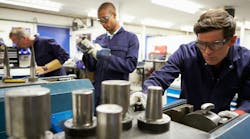Most high-profile stories of creative innovation tell of the Apples, Googles and Teslas of the world. Forward-thinking and a sense of discovery are regarded as rare organizational qualities—the domain of a select few.
But in reality, solving problems through experimentation and trial-and-error learning is humankind’s superpower. As Harvard evolutionary anthropologist Joseph Henrich puts it, culture is the secret of our success as a species.
Behind the scenes at companies that drive our economy, empowered employees innovate in unseen everyday ways. Internal-led organizational innovation can have a huge impact—and reflect an organization’s commitment to continuous improvement and evolution.
Take, for example, the innovation practices at these manufacturers:
Innovating workflow
W.L. Gore, the Delaware-based materials science company, has more than 1,000 products and several thousand patents. Considered by Fast Company as one of the most innovative companies in the world, and as one of Fortune’s Best 100 Best Places to Work for 21 straight years, W.L. Gore has baked innovation into its DNA.
The company provides its employees what it calls Dabble Time, like Google’s famous 20% time, where they are given one half day per week to pursue a new technology or product (of their own choosing) in an “innovation lab.” Dabble time fulfills two important functions. First, it creates a continuous pipeline of new products. Secondly, employees are encouraged to routinely rotate projects so that they can continuously learn and share what they have learned with new colleagues.
The company’s commitment to innovation creates a culture defined by continuous experimentation and learning. Gore provides employees opportunities to stretch their own skills and capabilities in ways that most companies simply don’t. W.L. Gore has an annual turnover rate of only 3%, much lower than its competitors. This bears out the notion that innovation is as much an HR issue as it is a business growth issue.
Innovating Accountability
Morning Star, the largest processor of tomato products in the U.S., is a fully self-managed company where there are no titles and no bosses. However, they practice radical, peer-to-peer accountability where individual and team performance are top priorities.
Morning Star requires new hires to write what is called a “colleague letter of understanding” (CLOU), addressed to a specific individual on the team they are joining. A CLOU outlines the value that the new hire believes she/he can make to the team in the coming year. Every two months, the recipient of a CLOU posts the progress of the CLOU’s author against the goals they set. The results are posted for everyone in the company to see.
Employees at Morning Star can’t hide from their performance. Nor are they fearful of “bosses.” Rather, they’re held accountable by their peers and teammates. Morning Star balances radical autonomy with radical transparency — a system that drives industry-leading financial performance.
Innovating Customer-Centric Decision-Making
Under Jean-Francois Zobrist’s leadership from 1983-2004, FAVI, the French automotive parts manufacturer, was transformed from a rigid, highly controlled manufacturing facility into a lean, agile, and intensely customer focused company. In the process, FAVI revenue grew significantly, becoming one of the leading auto parts suppliers in Europe.
Zobrist de-layered the company, removing two levels of management, and promoted experienced, line-level operators as “leaders,” reorienting the whole company around the needs of customers. A whole host of internal time-consuming and unproductive management practices were eliminated, and workers were given increased latitude in deciding production processes and schedules.
Time clocks were eliminated and employees were trusted to make big decisions. Production rates and employee engagement increased, and employees showed up early and stayed late because they felt ownership of their work.
Guideposts to Innovating
The examples of FAVI, W.L. Gore, and Morning Star demonstrate the power of human innovation. When trusted and given clear direction, most employees have more to give than many employers imagine.
Here are four specific innovation lessons we can learn from these examples:
1. Team-level decision making and autonomy. As Jean-Francios Zobrist put it, “Why would we not trust someone to make the same important decisions at work as they make every day at home?” Unlocking the decision-making potential closest to where it matters most —among line-level employees in the actual production of work — is critical to unlocking everyday innovation.
2. Peer-to-peer accountability. Not every company is cut out to be fully self-managing like a Morning Star, but team-level agreements (such as the CLOU), put real teeth into accountability. What at first might seem like a disorganized free-for-all turns out to be one of the most difficult (but equally rewarding) places to work.
3. Reorienting work around customers. Organizations that prioritize internal management processes (controls, reviews, punishment schedules, etc.) can easily lose sight of why the company exists in the first place. When Zobrist empowered FAVI employees to think and act with a customer-first mentality, they were able to reduce head count and increase productivity and profitability by reorienting everything around customers’ needs.
4. The power of everyday improvement. Continuous improvement and learning are arguably the most powerful forms of everyday innovation. Subtle tweaks and improvements to manufacturing processes might not make headline news, but they engage employees in essential and motivating ways. Empowering employees to innovate in how they work not only fulfills a deep human need; it also contributes to more efficient and effective outcomes.
Drew Jones, PhD, is an anthropologist, former business school professor, and practicing management consultant. He is a founding partner of Experient, a workplace culture and strategy consultancy. His new book is Open Culture Handbook: Five Questions to Drive Engagement and Innovation.



